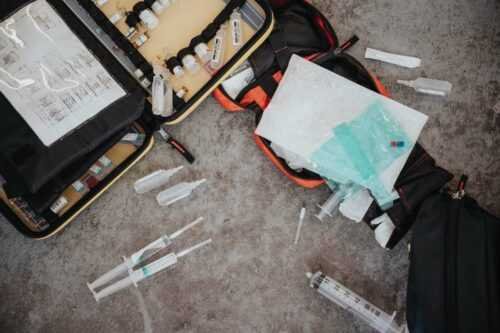
Each new journey is an exciting adventure. I want to predict everything in advance to remember only pleasant moments. The main guarantee of a healthy and enjoyable vacation is a well-stocked first-aid kit on the road.
Therefore, before you finally close your suitcase and go on a trip, make sure you take all the necessary medicines with you.
How to pack a first aid kit on the road?
An adequately assembled first-aid kit on the road can save a vacation, and this is the same necessary thing on a trip as a passport and a bank card. But the first-aid kit causes much more questions.
What do you need to take, and what can you do without? How to transport drugs across the border? How to buy the proper medication in another country and not overpay for branded drugs?
Skyscanner has put together a list of travel first aid kits that include everything you need and won’t take up much space in your luggage. Learn about all the intricacies of collecting the first-aid kit at sea and on any other vacation, and keep a list of medicines you should always have.
Remember that a first aid kit on the road will help with minor ailments but does not eliminate the need to see a doctor. When travelling, take all precautions (here are the WHO recommendations for the duration of the pandemic), and if you feel unwell, seek medical help.
What medicines to take in a first-aid kit: the necessary minimum

A first aid kit on the road is akin to insurance: you hope it will not come in handy, but you take it anyway – it’s more reliable. And then you take it home unpacked.
For those who are not ready to carry half a suitcase of medicines but do not want to just run around on a trip to pharmacies, we have compiled a first aid kit for one person for two to three weeks.
First aid kit on the road: what medicines to take on vacation
Our list includes only essential products for emergency use and the treatment of common ailments – by WHO recommendations.
This is the minimum set for a relaxing holiday, in which, if anything, it will be possible to consult a doctor or look into a pharmacy. It is unsuitable for hiking and long road trips to the ends of the earth.
The standard list of medicines on the road looks like this:
- Anti-inflammatory and painkillers – if you have a sharp headache, stomach or tooth, for example. Take medications that usually help you.
- Antihistamine tablets – This is a must-have item not only for allergy sufferers. Even if you have never experienced an allergy, it can suddenly appear on exotic food, an insect bite, or a plant’s flowering.
- Doctors recommend taking a new generation of funds that do not have a pronounced sedative effect. That is, from which you do not want to sleep.
- Medicines for intestinal disorders – It is difficult to predict how the body will react to unfamiliar food. And in hotels with all-inclusive service, tourists are tempted by a temptation called a buffet. Wanting to try as much food as possible, the vacationer often suffers from vomiting and diarrhoea afterwards.
- Toxins are removed from the body by various sorbents, which are not necessarily activated charcoal – now there are more modern and effective means. And probiotics can help improve digestion. They can be purchased without a prescription. However, using a first aid kit on the road is better.
- With an intestinal disorder, doctors strongly recommend taking rehydration products, in other words, to compensate for fluid loss. Such a solution is easy to prepare yourself from sugar, water and salt. But it is more convenient if you have a couple of bags with a ready-made composition in an emergency.
- Cold remedies – They can come in handy even if you are flying to rest on the sea. Soluble powders with vitamins or paracetamol are suitable for relieving cold symptoms. They are easy to use and can be purchased without a prescription at any pharmacy.
- Usually, a cold is accompanied by nasal congestion, so do not forget about nasal drops. For a sore throat, special sprays or lozenges will help.
- Means for treating abrasions, cuts, and wounds – brilliant green, iodine, hydrogen peroxide, chlorhexidine, healing ointments, bactericidal plasters, medical bandage and more.
- Sprays that protect against insects and ointments that relieve itching from insect bites. Treating your clothes and skin in advance is essential if you are relaxing somewhere in nature, in a forest or near a river.
- Sea sickness pills – It is better to take already-proven medicines that have saved you on previous trips.
- Don’t forget about taking regular vitamins and collagen supplement.
- Sunscreens – They protect the skin from burns.
If you have any chronic diseases, you should first take those medicines that you need to take regularly. In order not to overload the travel bag, you can calculate the dose in advance and put it in the pillbox exactly as much as you need for the trip.
Additional tips for building a first aid kit on the road
1. If flying by plane, remember that not all medicines are allowed in hand luggage. The only exceptions are those cases when taking the drug during the flight is a vital necessity.
It is better to familiarize yourself with the rules for transporting dosage forms in advance on the airline’s website.
2. Carefully study the requirements for the storage of medicines. For example, some medications only need to be stored at low temperatures. If it is impossible to put the mixture in a cold place, then do not take it with you.
3. Be sure to check the expiration date of each medication. Perhaps some of them are no longer suitable for use.
4. Try to replace liquid products with tablets or powders. During transportation, the contents of the vial may spill and stain clothing.
5. Take only proven products. Travel is the wrong time to experiment.
Stay healthy, and have a good journey!
Also Read:
How to Build Your Own Emergency Pet Kit






